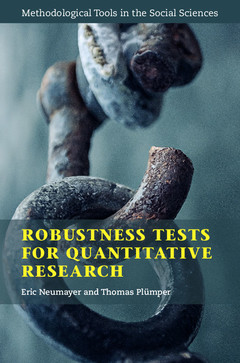Description
Robustness Tests for Quantitative Research
Methodological Tools in the Social Sciences Series
Authors: Neumayer Eric, Plümper Thomas
This highly accessible book presents robustness testing as the methodology for conducting quantitative analyses in the presence of model uncertainty.
Language: English
Subject for Robustness Tests for Quantitative Research:
Approximative price 65.00 €
In Print (Delivery period: 14 days).
Add to cart
Robustness Tests for Quantitative Research
Publication date: 08-2017
268 p. · 15.6x23.5 cm · Hardback
Publication date: 08-2017
268 p. · 15.6x23.5 cm · Hardback
Robustness Tests for Quantitative Research
Publication date: 08-2017
268 p. · 15.2x22.8 cm · Paperback
Publication date: 08-2017
268 p. · 15.2x22.8 cm · Paperback
Description
/li>Contents
/li>Biography
/li>
The uncertainty that researchers face in specifying their estimation model threatens the validity of their inferences. In regression analyses of observational data, the 'true model' remains unknown, and researchers face a choice between plausible alternative specifications. Robustness testing allows researchers to explore the stability of their main estimates to plausible variations in model specifications. This highly accessible book presents the logic of robustness testing, provides an operational definition of robustness that can be applied in all quantitative research, and introduces readers to diverse types of robustness tests. Focusing on each dimension of model uncertainty in separate chapters, the authors provide a systematic overview of existing tests and develop many new ones. Whether it be uncertainty about the population or sample, measurement, the set of explanatory variables and their functional form, causal or temporal heterogeneity, or effect dynamics or spatial dependence, this book provides guidance and offers tests that researchers from across the social sciences can employ in their own research.
1. Introduction; Part I. Robustness – A Conceptual Framework: 2. Causal complexity and the limits to inferential validity; 3. The logic of robustness testing; 4. The concept of robustness; 5. A typology of robustness tests; 6. Alternatives to robustness testing?; Part II. Robustness Tests and the Dimensions of Model Uncertainty: 7. Population and sample; 8. Concept validity and measurement; 9. Explanatory and omitted variables; 10. Functional forms beyond default; 11. Causal heterogeneity and context conditionality; 12. Structural change as temporal heterogeneity; 13. Effect dynamics; 14. Spatial correlation and dependence; 15. Conclusion.
Eric Neumayer is Professor of Environment and Development and Pro-Director Faculty Development at the London School of Economics and Political Science (LSE).
Thomas Plümper is Professor of Quantitative Social Research at the Vienna University of Economics and Business.
Thomas Plümper is Professor of Quantitative Social Research at the Vienna University of Economics and Business.
© 2024 LAVOISIER S.A.S.

